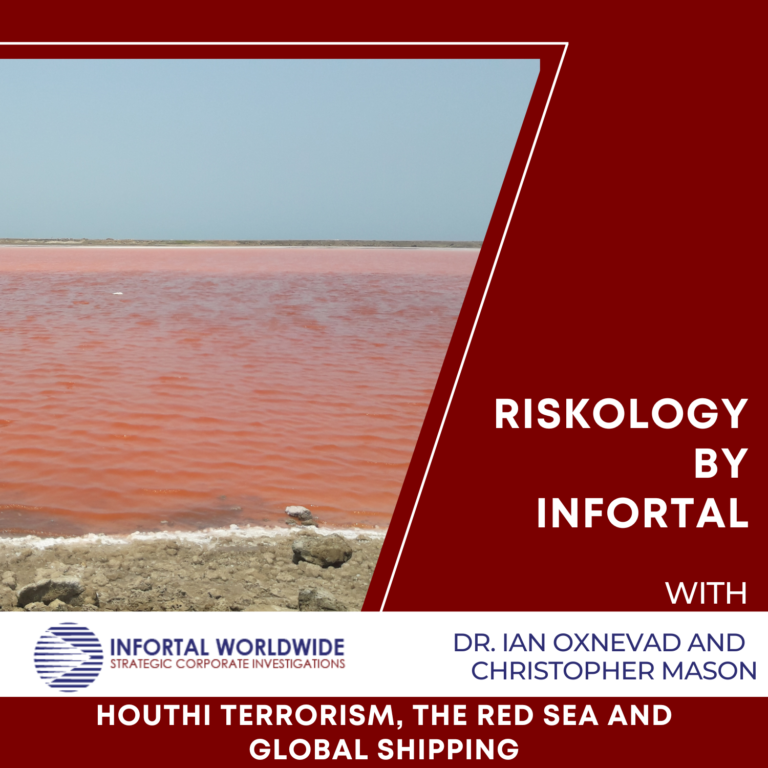When conflicts escalate around the world, supply chains are disrupted, and political power shifts, how can companies stay resilient and manage their risk? In this episode of the Riskology Podcast, Dr. Ian Oxnevad and Chris Mason explore the escalating conflict in the Red Sea and its implications for businesses operating in the region. With shipping routes severely impacted by attacks from the Houthi movement in Yemen, companies face significant disruptions and potential financial losses. Ian and Chris share their insights into how companies can navigate these risks, adapt their supply chains, and develop contingency plans to mitigate the impact of the Red Sea conflict.
Infortal Worldwide is a global risk management and investigation firm that specializes in helping businesses navigate complex risk landscapes. The company’s focus extends to various areas, including economics, politics, and geopolitical risk. By delving into these interconnected realms, Infortal Worldwide aims to provide clients with comprehensive insights that empower them to make informed decisions, especially in critical areas such as mergers and acquisitions, private equity investments, and other strategic moves.
You’ll hear Ian and Chris discuss:
- The conflict in the Red Sea is severely impacting shipping and logistics operations. Attacks from the Houthi movement have led to disruptions in shipping routes, causing delays and increased costs for companies.
- Companies have been forced to reroute their ships around Africa, which leads to significant delays and increased costs for companies. This not only adds financial strain but also creates congestion in alternative ports, further impacting logistics and supply chain operations.
- European countries are hesitant to get involved in a coalition to protect international shipping due to their vulnerability to oil flow disruptions and the need to utilize their military strategically, and this lack of coordination poses additional risks for companies relying on the Red Sea route.
- The impact of the conflict in the Red Sea extends beyond the Middle East, potentially disrupting global supply chains and causing inflationary pressures on consumer prices. With 98% of maritime shipping between Asia and Europe passing through this route, any disruptions can lead to significant delays, increased costs, and shortages of goods.
- Companies, especially those heavily reliant on the Red Sea route, need to develop contingency plans and alternative routes to mitigate the risks and disruptions caused by the conflict. Assessing supply chains, identifying alternative transportation options, and establishing partnerships with reliable logistics providers are crucial steps to ensuring business continuity.
- Startups and new players are emerging in the logistics industry to address the challenges posed by the conflict, offering alternative overland routes and solutions. These innovative approaches demonstrate the potential for agile and adaptive solutions in times of crisis.
- Companies must prioritize intelligence gathering, due diligence, and boots-on-the-ground experience to navigate the complex geopolitical landscape and identify reliable partners in affected regions. Understanding the political dynamics, assessing risks, and conducting thorough background checks on potential collaborators are essential for mitigating risks and ensuring compliance with regulations.
- While the conflict in the Red Sea poses significant challenges, it also opens up opportunities for innovative companies to fill gaps in the market. By embracing dynamic assessment, diversifying supply chains, and exploring new partnerships, businesses can position themselves for success in a rapidly changing global landscape.
Key Quotes:
“To be frank… this is a disaster for shipping.” – Ian
“Every risk is an opportunity. Companies need to start thinking with that mindset.” – Ian
“[This] has really been a great illustration of how quickly supply chains can break down and how important it is to be prepared.” – Chris
“You’re going to need intelligence and boots on the ground, due diligence, and knowing who you do business with.” – Ian
Resources:
Dr. Ian Oxnevad on LinkedIn
Chris Mason on LinkedIn



